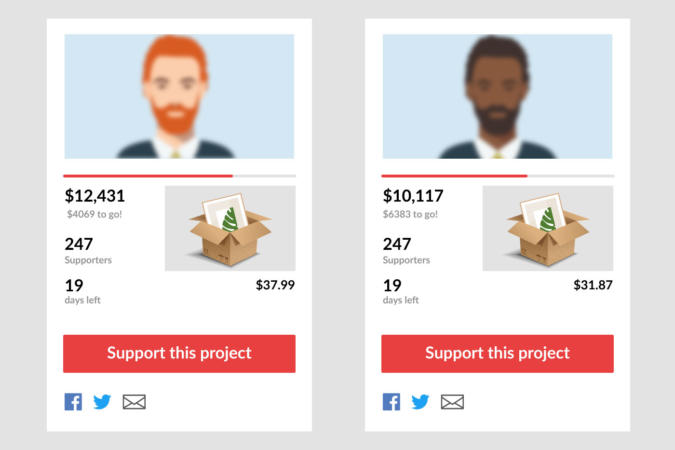This story originally published on March 8, 2019
Crowdfunding sites like Kickstarter, Gofundme, and Indiegogo are important tools for entrepreneurs. When you’re looking to launch a new business or project, it can be an excellent way to help offset costs and raise capital.
The great thing about crowdfunding is that it’s accessible to anyone, but a new study has revealed how racial bias impacts the support Black people receive on crowdfunding platforms.
Black entrepreneurs are less likely to meet their fundraising goals and, if they do make a product, people won’t pay as much for it, according to a series of studies from Northeastern University.
The authors of the study — Venkat Kuppuswamy, an assistant professor of entrepreneurship and innovation at Northeastern University, and Peter Younkin, from the University of Oregon — have dedicated a lot of time to understanding the role racial bias plays in crowdfunding.
“I began researching crowdfunding platforms in 2011, when they were just beginning to gain popularity,” Kuppuswamy told Afrotech. “Since they were relatively new, I conducted a lot of qualitative interviews with actual/prospective crowdfunding entrepreneurs and heard on more than one occasion that minority-led projects may face additional hurdles.”
This inspired Kuppuswamy and Younkin to do some of their own research. In their original 2017 study, they found that “African American men are significantly less likely than similar white founders to reach their fundraising goals” and people “rate identical projects as lower in quality” when they see the founder is Black.
This made Kuppuswamy and Younkin wonder how that bias impacts another important aspect of business: product pricing. In their latest study, published this year , they looked into it by creating three different founder pages for the same product.
For the product, they picked a wooden tray with a charging jack attached that’s designed to also hold your cellphones and keys. It’s an actual product that can be found on Kickstarter.
One page included a picture of a white man as the company founder, while the other had a picture of a Black man. On those pages, the researchers included identical text from the founders.
However, they also created a third page. It was pretty much the same as the Black entrepreneur’s page but, on this one, they switched up the text a little. According to Northeastern University, the text now included: “I wanted to provide finely crafted African-American made products…” and described the founder as a “Black industrial designer and former high-end furniture designer.”
The researchers wanted to see what would happen when a founder put explicit emphasis on their own race.

Then, the researchers recruited 326 U.S. based participants from Amazon Mechanical Turk. They split participants into three experimental groups to decide how much they’d be willing to pay for a product. When the product was thought to be made by a white entrepreneur, the first group recommended $29.11 as the price. The second group, who thought the entrepreneur was Black, suggested $22.99.
The third group suggested $25.21 when looking at the founder who emphasized they were Black. A smaller gap yes, but it’s clear that when a product was thought to be made by a Black person, people were willing to pay less. That original six dollar difference may not seem like a lot, but it’s a 21% drop and it has consequences.
As Kuppuswamy summarized, crowdfunding is becoming a ‘proof-of-concept’ platform, “where success can lead to subsequent venturing financing from more traditional sources”, like banks. Black people who are hit by this price penalty may miss out on those additional benefits of crowdfunding.
The researchers found that, if a product page includes material costs and the labor involved, then people were less likely to suggest different prices.
“We find that much of the pricing bias is because the crowd assumes Black entrepreneurs to have a lower cost of production,” Kuppuswamy said. “Highlighting the cost of materials, the timeline of the project, and the various tasks involved once funds are awarded would certainly help mitigate this penalty.”
Platforms themselves can help combat this bias by encouraging people to include as much detail as possible about their products, like the specific use of funds.
Crowdfunding is used for more than potential businesses, though. People use sites like Gofundme to raise money for medical expenses and personal emergencies.
Although Kuppuswamy and Younkin haven’t conducted their own research into that area, their studies suggest that racial bias might impact those fundraisers, too.

